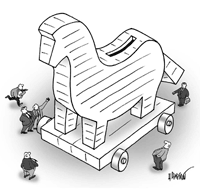Party of Democratic Forces

Governing bodies of the Party of Democratic Forces
The following are the PDF Governing bodies:
- The Congress;
- The Council;
- The Permanent Bureau;
- The Censor Commission.
The Congress is the supreme governing body of the PDF and is convened at least once in two years. The Congress is convened by the Council or at the request of at least half of the territorial organizations. The Congress is deliberative provided at least half of the delegates attend.
The PDF Congress:
- Adopts or amends the bylaws, program and other party documents;
- Elects:
- The Chair;
- The Council;
- The Censor Commission.
- Designates candidates in view of presidential elections; or may delegate this responsibility to the PDF Council;
- Approves the party symbol;
- Evaluates the party central and local governing bodies and oversees their activity;
- Decides on PDF dissolution and designates liquidation commission.
All Congress resolutions, except for those provided in letter f. above, shall be adopted by the majority vote of the delegates in attendance.
The Council includes alternate members and regular members. At the recommendation of County Councils and that of Chisinau Municipality the PDF Congress elects the Council. The Chairs of county organizations and that of Chisinau Municipality are ex officio members of the PDF Council. Party county councils and that of Chisinau Municipality may request the PDF Council to replace their representatives, if the latter are not active. In similar cases the Censor Commission may request PDF Council to replace certain members of the Council. Alternate members of the Council attend the Council sessions and are entitled to a consultative vote, whereas upon the absence of the Council members they are entitled to a deliberative vote based on the decision of the Territorial Council's Permanent Bureau.
PDF Council:
- Implements the program and bylaws;
- Convenes the PDF Congress and establishes the representation procedure for the PDF Congress, county Conferences and at the Chisinau Municipality Conference;
- Approves party symbol, electoral platform in view of presidential, parliamentary and local elections; approves PDF candidates lists in parliamentary elections;
- Recommends the Congress to modify the bylaws or program;
- Recommends the Congress to approve PDF merger or association with other parties;
- At the recommendation of Party Chair elects the Permanent Bureau of the Party Council, Deputy Chairs and Secretary;
- Decides on the membership fees.
As a rule the Council sessions are convened at least three times per year, or whenever it is necessary. Permanent Bureau convenes the sessions, whereas the Party Chairperson chairs them. The Council session is deliberative provided at least half of its members are in attendance. The Resolutions are adopted by the majority vote.
Permanent Bureau
The following are the ex officio members of the Permanent Bureau: the Party Chair, the Deputy Chairs, the Secretaries of the County Councils (Chisinau Municipality), the Council Secretary. The Party Chairperson chairs the Permanent Bureau sessions. The Permanent Bureau of the PDF Council:
- Coordinates the party activity in line with Congress and Council resolutions;
- Coordinates the activity of county organizations and that of Chisinau Municipality;
- Together with the Party Chairs administers the party patrimony;
- Submits for PDF Council approval agreements on alliances with other parties;
- Convenes PDF Council;
- Approves internal personnel regulation.
The Permanent Bureau sessions are deliberative provided the majority of elected members attend. The decisions are adopted by the majority vote of the Permanent Bureau members.
The Congress elects the Party Chairperson. Election procedure is establishes by the Congress. In cases several candidates run for the position and neither of them gathers a simple majority vote of the Congress delegates, the second round shall be held. In such cases, the candidate who gathers the highest number of votes shall be considered elected. The Congress may revoke at any time the Party Chairperson by the majority vote of its delegates. The revocation proposal should be endorsed by at least 2/3 of the territorial organizations or by the PDF Council.
The Party Chairperson coordinates the activity of the Council and Permanent Bureau; represents PDF in relations with other parties, domestic and international governmental and non-governmental organizations, or may delegate these responsibilities to one of his/her deputies.
Censor Commission includes 7-9 members, elected by the majority vote of the Congress delegates. The Censor Commission elects its Chairperson, deputy Chairpersons, and its Secretary. The Commission oversees the observance of bylaws, the enforcement of party program and Congress resolutions, as well as those issued by other governing bodies, administration of funds and patrimony. The Censor Commission hears cases of violation of bylaws, program, and legal and financial norms; and recommends the Permanent Bureau of the Council to take appropriate measures. Members of the Censor Commission may not simultaneously be members of the PDF Council or its Permanent Council.
Party of Democratic Forces:
Governing bodies /
Statistics /
Participation in elections
|


